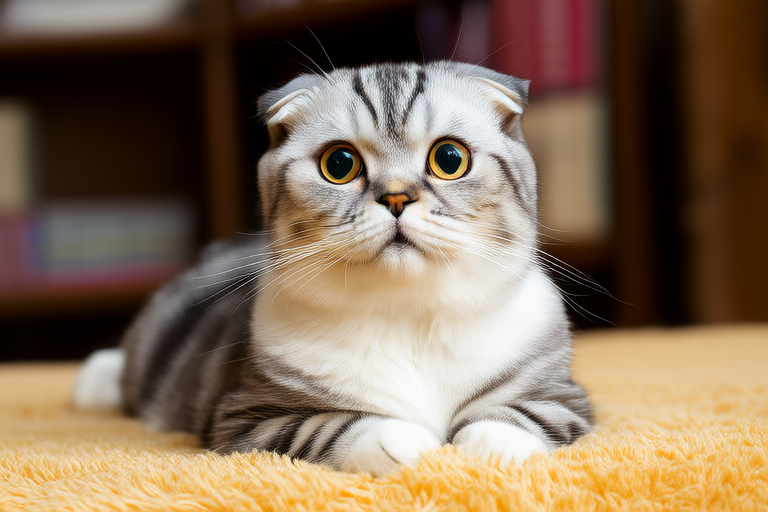The Cozy Companion: Everything You Need to Know About Scottish Folds
Welcome to the world of Scottish Folds, one of the most beloved cat breeds known for their unique appearance and friendly demeanor. These charming felines have captured the hearts of many with their distinctively folded ears, giving them an endearing and somewhat owl-like appearance. Their temperament is equally captivating, making them ideal companions for families and individuals alike. In this comprehensive guide, we will explore everything you need to know about Scottish Folds, from their origins and physical traits to their dietary needs, grooming routines, and common health issues.
Origins and Physical Characteristics
The story of the Scottish Fold begins in 1961, when a shepherd cat named Susie was born in Scotland with a genetic mutation that caused her ears to fold forward. Her offspring inherited this trait, leading to the development of the Scottish Fold breed. Today, these cats are recognized for their striking appearance, which includes large, round eyes and a compact, well-balanced body. The hallmark of the Scottish Fold is its folded ears, which can come in single or double folds. However, not all kittens born to Scottish Fold parents inherit this trait; some may have straight ears instead.
Scottish Folds come in a variety of coat colors and patterns, including solid colors, tabby, tortoiseshell, and bi-colors. Their coats can be either short or long-haired, adding to their diverse appeal. Short-haired Scottish Folds have a dense, plush coat that requires minimal grooming, while long-haired varieties have a silky, medium-length coat that benefits from regular brushing to prevent matting.
Temperament and Suitability as Pets
Scottish Folds are renowned for their gentle and affectionate nature, making them excellent companions for people of all ages. They are generally calm, easygoing, and enjoy being around their human family members. These cats are often described as having a dog-like loyalty, as they tend to follow their owners from room to room and seek out their company. They are also known for their playful personalities, especially during their kittenhood, but they remain active throughout their lives.
Due to their friendly disposition, Scottish Folds are particularly well-suited for households with children. They are patient and tolerant, making them great playmates for kids. Additionally, they get along well with other pets, such as dogs and other cats, provided they are introduced gradually and given time to adjust to each other. Their adaptability and sociable nature make them a popular choice for families looking for a loving and interactive pet.
Dietary Needs and Grooming Tips
Like all cats, Scottish Folds require a balanced diet rich in protein, vitamins, and minerals to maintain optimal health. It’s essential to choose high-quality cat food that meets their nutritional requirements. Consult with your veterinarian to determine the appropriate portion sizes and feeding schedule based on your cat’s age, weight, and activity level. Fresh water should always be available to keep your Scottish Fold hydrated.
Grooming is another important aspect of caring for your Scottish Fold. Regular brushing helps to remove loose hair and prevent matting, especially for long-haired varieties. Pay special attention to the areas behind the ears, where hair can become entangled. Bathing should only be done when necessary, as excessive bathing can strip the natural oils from their skin. Trim their nails regularly to prevent overgrowth and discomfort. Dental hygiene is also crucial; provide your cat with dental treats or toys to help keep their teeth clean.
Common Health Issues
While Scottish Folds are generally healthy, they are prone to certain health conditions due to their genetic makeup. One of the most significant concerns is osteochondrodysplasia (OCD), a condition affecting the joints and cartilage, which can lead to arthritis. This condition is more common in cats with folded ears. To minimize the risk, it’s recommended to avoid breeding cats with severe ear folding.
Another issue to be aware of is cardiomyopathy, a heart condition that affects some Scottish Folds. Regular veterinary check-ups, including heart screenings, can help detect and manage this condition early. Obesity is also a concern for this breed, so maintaining a healthy weight through proper nutrition and exercise is vital.
Choosing a Scottish Fold
If you’re considering bringing a Scottish Fold into your home, it’s important to research reputable breeders who prioritize the health and well-being of their cats. Look for breeders who provide health certificates and genetic testing results for their cats. Visiting the breeder’s facility and meeting the parent cats can give you insight into the environment in which your new kitten was raised.
Adopting a Scottish Fold from a shelter or rescue organization is also a rewarding option. Many shelters have Scottish Folds available for adoption, and by providing a forever home, you’ll be giving a deserving cat a second chance at a happy life. Shelters typically provide information about the cat’s background, health status, and any specific care requirements.
Conclusion
The Scottish Fold is a delightful addition to any household, offering a unique blend of charm and companionship. With their distinctive folded ears, friendly demeanor, and adaptability, these cats are sure to bring joy to your life. By understanding their dietary needs, grooming requirements, and potential health issues, you can ensure a long and healthy life for your Scottish Fold companion. Whether you choose to adopt from a breeder or a shelter, welcoming a Scottish Fold into your family is a decision you won’t regret. For further reading, consult books and articles on cat care and breeding, and don’t hesitate to reach out to veterinarians and breeders for personalized advice.
